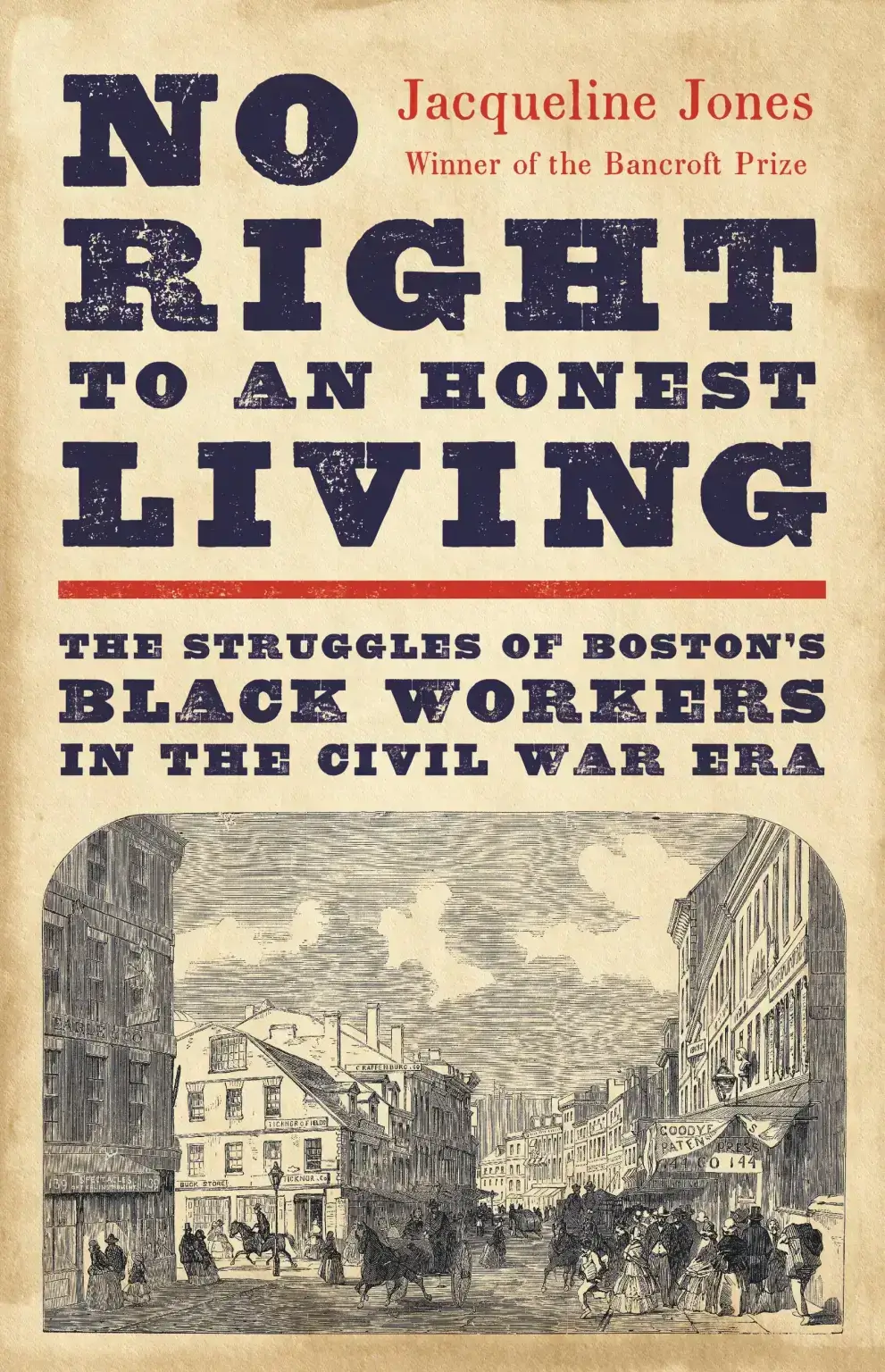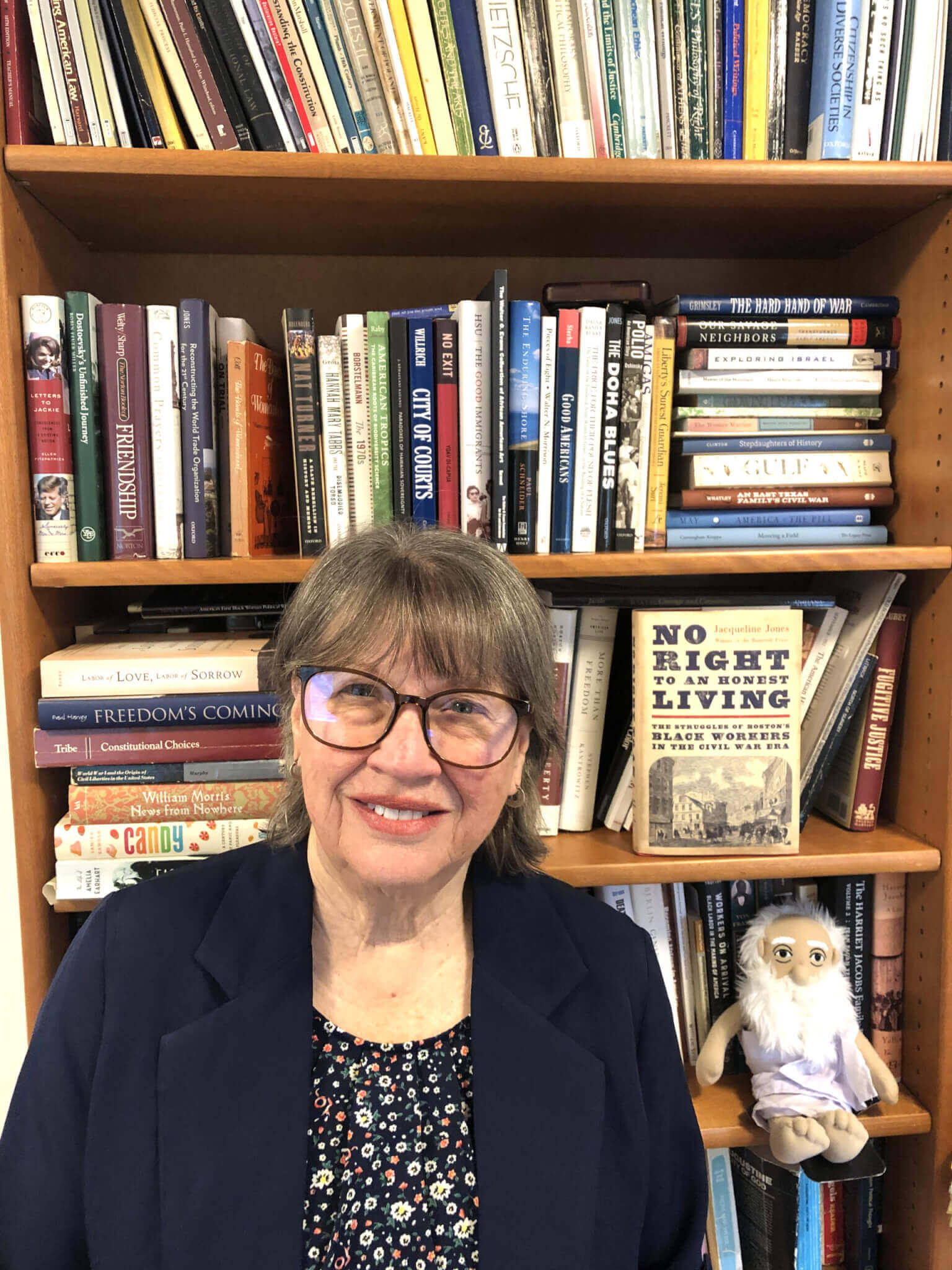By Blake Maddux — Correspondent
When The Concord Bridge spoke to Jacqueline Jones early last year, she had already won a Bancroft Prize for her writing on history.
This month, she won the 2024 Pulitzer Prize for “No Right to an Honest Living: The Struggles of Boston’s Black Workers in the Civil War Era.”
The Pulitzer committee praised Jones’s “breathtakingly original reconstruction of free Black life in Boston that profoundly reshapes our understanding of the city’s abolitionist legacy and the challenging reality for its Black residents.”
Having twice been a finalist for the prize (in 1986 for “Labor of Love, Labor of Sorrow,” for which she won the Bancroft, and in 2014 for “A Dreadful Deceit”), Jones admitted she’d been making “the third time’s the charm” jokes.
After spending decades teaching at Wellesley College, Brandeis University, and the University of Texas at Austin, from which she retired in 2021 and where she holds the title of professor emerita, Jones moved to Concord in 2020 with her husband, law and political science scholar Jeffrey Abramson.
The Bridge caught up with Jones to talk about her Prize-winning book and her writing practice.
Q: What do you like about living in Concord?
A: Concord has a fascinating history, a more diverse history than some people may realize. Obviously, a lot of great writers lived here. I love the literary vibes.
Q: What is your writing process?
We usually go to Sudbury to meet our grandkids at the bus, so I’m used to working an 8-2 schedule if I can. I feel that if I can put in a good five hours or so, that’s really a whole day. After that, I’m probably not going to get much done. I always picked the kids up from daycare when they were little, so I got into a rhythm of working until 2 or so. I usually work at the kitchen table or the dining room table.
Q: How did you learn you had won the Pulitzer?
A: We were at our grandchildren’s house in Sudbury. My husband was playing basketball with our grandson Henry, who is eight, and I was the referee. I was calling three-pointers and fouls. I like to play ref because I get to check my phone every once in a while! I checked my messages and I had one from an editor I know, not the one for this book, and it was kind of cryptic. It just said, “Congratulations Jackie.”
At that point, I looked up when the Pulitzer Prizes were going to be announced and found out that it was that afternoon. I wrote back to her with a question mark, and she wrote, “You just won a Pulitzer Prize.”
Everybody wants to [win a Pulitzer], but the chances are not very good! I am very humbled by this because there are so many wonderful books published every year, and hundreds of fabulous history books. It is a bit arbitrary… I do put it in perspective. But I’m thrilled, obviously. I wake up in the morning and say, “Did this really happen?”

Q: What led you to write “No Right to an Honest Living”?
A: I was familiar with a lot of great literature on what’s called the first civil rights movement in New England — the struggle for Black people’s right to vote, sit on juries, intermarry, and integrate schools. These struggles have all been well-documented. But I was struck by the fact that the historians who wrote about this topic really didn’t write about work.
Since work is such a central lived experience for most people, I thought it was a good idea to look at the division of labor — see who was doing what and under what conditions. I did find that despite the success of many of the pushes for civil rights, there was no economic justice in the workplace. Inequality was very much embedded in the Boston workplace.
Q: The Pulitzer Prize page for the 2024 winner in history describes the book as “a harrowing portrait.” Why was it harrowing?
A: It was harrowing for the people who were living through this. I talk about the issue of casual labor: going from one time-limited job to another, the uncertainty and unpredictability. [It was] really terrifying: family, rent, food. That was a harrowing way to live.
Q: What were your most significant takeaways from writing the book?
A: I was interested in the contrast between the noble egalitarian rhetoric used by Boston abolitionists in the period before the Civil War juxtaposed with the reality of the workplace, which was very unequal. Another point was the lack of support that potential white allies gave Black workers. I looked in detail at white abolitionists, who seemed to care more about enslaved people in the South than they did their Boston neighbors.
I looked at labor reformers, who were mainly concerned with the white working class and factory operatives. I looked at the Republican Party, which did not consider Blacks a significant constituency because there were so few of them at the time. You would think that city authorities, since Black people were taxpayers, would consider them for public works jobs, but they did not. Those were limited to white people.
Academics in the late 19th century seemed to be contributing to the pseudoscience of racism, or racial difference. And a final group was white veterans, who I thought would probably appreciate the sacrifices made by Black veterans in the Civil War, but they remained segregated. These potential white allies were — for their own reasons — not supportive of economic justice in the workplace.
Q: What messages does this book have for readers?
A: I think there are two things. It provides a background for the inequality that we see in Boston today. People who could not get good jobs had to rent; they could not afford to buy their own homes or move to the suburbs. There were restrictions on Black homeowners through banks, redlining, zoning restrictions, and restrictive covenants until well into the 20th century. These 19th-century patterns still affect us today.
And there’s a lot of talk about critical race theory, which is really just an intellectual framework for studying American history. I don’t use the term, but I think this book looks at the ways these discriminatory practices affected Black families and communities to understand how this systemic discrimination had continuing effects. My sense is that people who discuss CRT have no idea what they’re talking about. [They] throw around the term, but they haven’t bothered to think about it or learn about it. This book is actually an example of CRT in action.
Q: What are you working on now?
A: The American Academy of Arts and Sciences, which is headquartered in Cambridge, has commissioned me to write a history of the Academy. It was founded in 1780 by John Adams, and it’s going to celebrate its 250th anniversary in 2030.
Editor’s Note: This story has been updated to correct references to Jones’s previous receipt of The Bancroft Prize. Jones received that award in 1986 for “Labor of Love, Labor of Sorrow: Black Women, Work, and the Family, from Slavery to the Present.”






